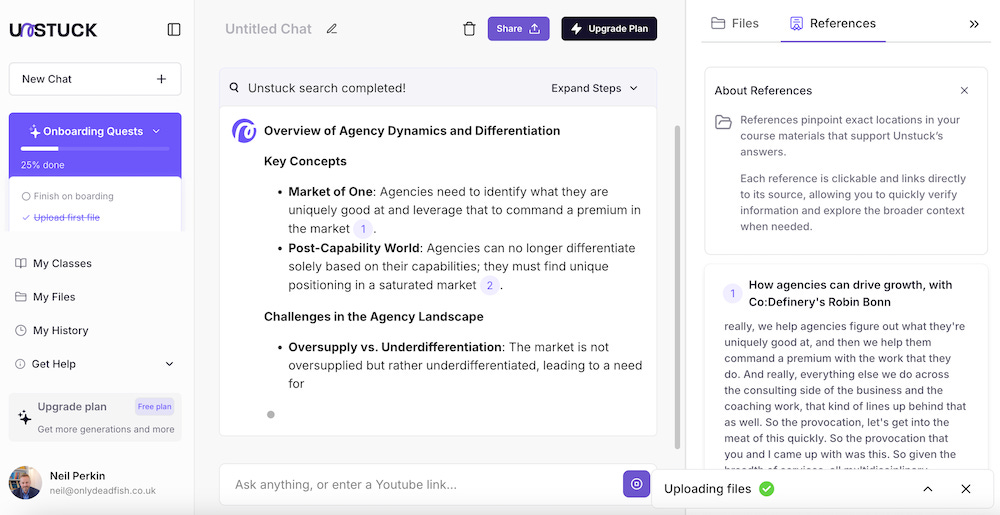Fish Food: Episode 619
The 6 types of wealth, AI video summaries, 185 real-world GenAI use cases, ChatGPT search, Gemini in Google Maps, and Hedy Lamarr
This week’s provocation: the six types of wealth
A more personal provocation this week. I have a sticky note on the wall in my office which lists the six types of wealth: Money, Time, Relationships, Health, Knowledge, and Experiences. I put it there as a constant reminder that there are different types of wellbeing and wealth, not just financial. It’s a deceptively simple but powerful way to think about how to get the most out of life.
When we think about ‘being rich’ we immediately think in primarily financial terms. And of course, money gives us what we need to live, the freedom to make different choices and pursue personal goals. In theory financial security gives us the ability to invest in other forms of wealth (free time, relationships, physical activity, learning). In practice we often tend to focus on financial prosperity to the detriment of other types of wealth.
Time is surely one of the most underrated forms of wealth. We only have so much of it. We can always do with more of it. Not least because it gives us the freedom to invest in other forms of wealth. In his wonderful book Four Thousand Weeks (which is definitely worth spending time with) Oliver Burkeman says that trying to control and maximize every moment can easily lead to dissatisfaction. Instead, we should embrace the reality that we cannot do everything and focus on meaningful, purpose-driven choices about how we spend our limited time rather than pursuing an impossible ideal of total productivity or efficiency: "The more you try to manage your time with the goal of achieving a feeling of total control and freedom from the inevitable limitations of being human, the more stressful, empty, and unfulfilling your experience of time will be". Creating time wealth is about much more than productivity hacks.
Investment of time in things that contribute to our mental and physical health, or to the depth and quality of our relationships, or to lifelong learning, or to experiences that stay with us and help to define who we are, also contributes to a sense of belonging, purpose, and happiness.
In 2022 the Japanese government posted an article on their official website describing the Japanese concept of Ikigai as ‘that which brings value and joy to life: from people, such as one’s children or friends, to activities including work and hobbies’. Héctor Garcia and Francesco Miralles had already written what has become one of the most renowned books on Ikigai, and featured in it a Venn diagram (originated by US entrepreneur Marc Winn) to illustrate the concept:
The authors interviewed 100 elderly residents of Ogimi (often called the ‘village of longevity’) and noted how every one of them could explicitly describe what their Ikigai was. ‘Everyone knows what the source of their zest for life is, and is busily engaged in it every day’, says Garcia.
The fact that I somehow continue to fail at striking the right balance between these different forms of wealth is probably a sign that I need some other nudges to help me prioritise better. As Oliver Burkeman says, ‘what you pay attention to will define, for you, what reality is’. Every one of the six forms of wealth is deeply entwined with the others. An imbalance in one leads to shortcomings in the others. Being true to yourself and not leading the life that others expect of you means achieving the right kind of harmony between the six kinds of wealth.
Balance is the daily battle of life.
Image: Nimbosa derived from works in the PUBLIC DOMAIN, CC BY-SA 4.0
If you do one thing this week…
I was yesterday years old when I learned about Unstuck, the AI study tool. You have to sign up to it but once you do you can simply put study.new/ in front of any YouTube video URL (demo here if you need it) and it will summarise all of the key points from the video for you in a few seconds. You can even create a ‘class’ of several videos. As a test I got it to summarise the recent Robin Bonn Firestarters episode on how agencies can drive growth and differentiation (although I clearly recommend you watch the whole thing of-course). Endlessly useful.
Links of the week
Gosh. Google have published a list of 185 real-world use cases for how some of world’s leading organisations are already using GenAI. Some excellent examples in here - one to bookmark (HT Piotr Bombol)
ChatGPT Search functionality is now live (to paid users). I had a play around with it this week and it’s pretty good - it gives you the answer rather than a list of links, but then also references a list of sources which you can click on. You can see some good demos here. I’m not sure that it does much more than Google Gemini results already do though.
Speaking of Gemini, Google have now integrated some nice AI features into Google Maps including the ability to ask it for recommendations, and an expansion of the amazing immersive view feature which uses computer vision to enable you to experience particular places. I’ve long thought that Google Maps had the potential to be something of a super-app (it’s used by over 2 billion users a month) and maybe this is how it happens.
‘Technologies and platforms don't move through the adoption lifecycle...it is the specific application or "use case" of the technology that is adopted’. An important nuance which is often missed in this post about common misconceptions around the diffusion of innovations and the ‘crossing the chasm’ concept.
Some interesting ethical questions raised this week by a project which has used AI to recreate the voice of Michael Parkinson (who died last year) to interview people for a podcast.
Some revealing new research from Bruce Daisley and Early Studies on people’s evolving attitudes to work shows that young people expect job security to decline in the future and that the number one thing that workers value is flexible working.
Quote of the week
‘People are unreasonable, illogical and self-centred; love them anyway. If you do good, people will accuse you of selfish, alternative motives; do good anyway. The biggest people with the biggest ideas can be shut down by the smallest people with the smallest minds; think big anyway. What you spend years building maybe destroyed overnight; build anyway. Give the world the best you have and you’ll be kicked into defeat; give the world the best you’ve got anyway’
Hedy Lamar, who was so amazing that as well as being one of the biggest Hollywood film stars of her day had a side-project in which she invented the technology behind Wifi.
And finally…
I love obscure short films made by and about people with passion and enthusiasm and this short film about a community of Punjabi women in Southall who love old BMWs is a joy (HT Russell Davies)
Image: By Vauxford - Own work, CC BY-SA 4.0
Weeknotes
This week I’ve been mostly writing and doing a bit of work with my PR agency client. Next week I’m travelling again, working with leaders at a bank in the Middle East and finishing off the report I’m writing on the evolution of marketing operating models. Fun fact - I once had an old 3-series much like the one above. Kinda wish I’d kept it now.
Thanks for subscribing to and reading Only Dead Fish. It means a lot. If you liked this episode please do like, share and pass it on. If you’d like more from me my blog is over here and my personal site is here, and do get in touch if you’d like me to give a talk to your team or talk about working together.
My favourite quote captures what I try to do every day, and it’s from renowned Creative Director Paul Arden: ‘Do not covet your ideas. Give away all you know, and more will come back to you’.








Thanks, Neil, the Unstuck thing is very handy